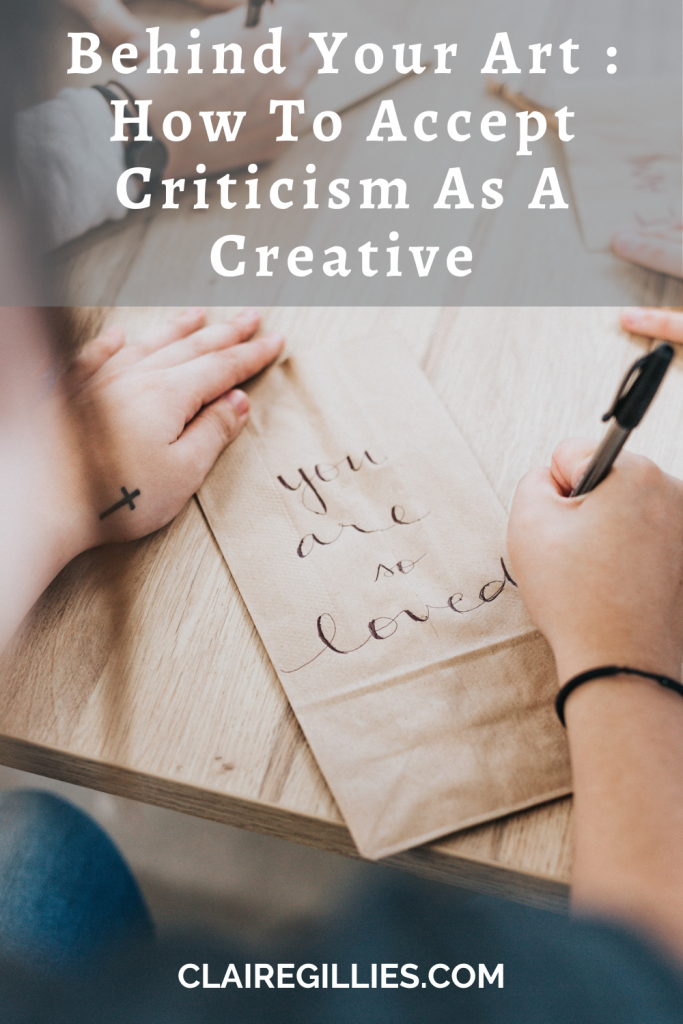When we produce art (no matter what it is) the fact that we’ve spent time and listened to our curiosity is special. We’re curious to see where it leads us, and that curiosity brings art into being. Finding the courage inside you to dedicate time to your craft, without looking too far into the future, is for some, the key to keep going. But when you finally put your work out there, you may receive feedback. Can you listen to it without falling into a heap and regretting all your spent efforts? Behind Your Art : How To Accept Criticism As A Creative.
Not Taking The Chance
Many people talk about their creative endeavours for years, but never take the plunge. This will be tied up with fear, for so many reasons – (check out my blog on 7 Reasons Why You’re Self Sabotaging Your Own Success) I spoke with a friend once who told me they wanted to write a book, and they spent the next twenty minutes describing the book to me in fine detail. The characters, the world building, their plot! But they never wrote the book. And I wonder now what was the reason behind that. Could they have looked too far into the future and the ‘what if’s’ paralyzed them before they even started their project?
Who would read it? Who would want to read it? Would everyone laugh at me?
It’s scary releasing your work into the world. Even more scary hearing people’s ‘critical feedback’ on it!

Asking For Critical Feedback
I recently entered a program where readers would read my book and give it marks out of ten, along with an honest review of the book. I was pretty game to try it out; I was interested to know what people thought – people who didn’t know me and who could look at my book objectively.
So I get my reviews back. I’m excited to open the email. I scan its contents, reading what these anonymous people had said about my book.
But I realise while reading that my body is tense, my heart is racing, I’m on edge.
I know fully that their constructive criticism is hitting me. I can’t relax, I’m waiting for someone to say something really mean. I’m taking it personally. What they are saying is affecting me, even though I told myself time and time again it wouldn’t.
How can you not take things personally?
Especially when it comes to your work? Say you have been working on a creative project for years, your time, effort and money have gone into it. You lived with that creative project on your mind, day in day out. Working on it, perfecting it. Then someone glances at it and gives their opinion, which might not be an opinion you wanted to hear.
My Journey
Writing a book is no easy feat, and for me, it was a journey that took years.
Ten years, to be exact.
I had started writing it, only to hit a creative wall that I couldn’t seem to climb over. So I put it aside for a few years, thinking I would never finish it. But one day, I decided to pick it back up and complete what I had started.
It was a long road. I watched all the writing videos I could, read the books, tried my best to understand the story structure. So more time was spent, experiences gained along the way, some life changing. I grew as a person, but that book was still on my mind.
When I eventually finished it, I was relieved to get back to my life and move on. But with all that emotional baggage attached to it, receiving critical feedback had been a tough process. In some ways, the book was my baby. It was hard to separate my emotions from the book and not take the criticism personally.

Talk Myself Down
I realised the book was not me, and I needed to detach myself from it. It was just something I had made, and I was onto the next thing. I had to remind myself that I couldn’t control people’s opinions, and that art is subjective. What a person experiences may affect how they like a particular piece of art.
Art is a subjective expression. It’s difficult to measure.
This novel was something I created, putting time and effort into it…but it’s done…
I’m onto the next thing. I’m growing and writing more. I’m learning with each book I write. And this is just another way I can learn more. If I put my energies into the book long after I’ve finished and released it, then I’m not really moving on. I can’t control people’s opinions. We all have different tastes. It’s that simple, really.
Behind Your Art : How To Accept Criticism As A Creative
Breathe
So I took a few deep breaths, I calmed myself. I told myself I had indeed moved on. I was always improving my craft, and this was another way I could improve. I also told myself I have had many good reviews from people, and should not get bogged down in people pleasing. So I took a step back and made the most of what the anonymous reviewers actually said. I decided to ask myself how can I learn from this process?
By putting myself out there, I was giving myself the opportunity to grow as a writer and get a thicker skin.
Your turn
Is there something you’ve been too afraid to try as you don’t want to face criticism?
I encourage you to take the leap. It’s easy to want to stay in a safe space, but the more you put yourself out there, the more you’ll grow and learn. Criticism is not always easy to accept, but it’s part of becoming a better artist.
So take a chance and let your creativity soar. You never know where it might take you.
YOUR TURN?
How do you deal with criticism? What’s the worst criticism you’ve received about your work?
If you enjoyed this, have a look at my previous posts such as – Between creative projects – where to go from here?

PIN FOR LATER – Behind Your Art: How To Accept Criticism As A Creative


Leave a Reply